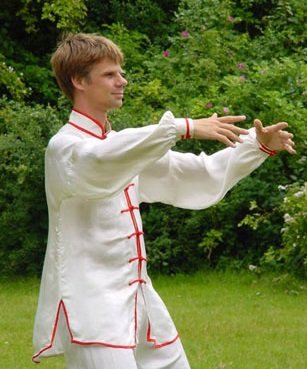Taijiquan courses in Amsterdam
Taiji quan (Tai chi chuan, 太极拳) is a component of WuShu (武术, the traditional Chinese Martial Arts). This very special martial art does not focus on speed and muscular strength,but more on internal power (qi 氣) and spirit (shen 神). With attention (yi 意), a perfect posture, and effective movements, you will learn to use the internal power very efficiently.
In the early morning in the public parks in China, you can see lots of people from all walks of life practising taiji quan. Mainly, they do this for health benefits: The training helps you to develop and guide your vital life energy (qi 氣). You will improve your posture, so that the energy can circulate more fluently through your body. After a period of intensive training, you will notice that your body and mind are more relaxed and that your stability has been improved.
In Amsterdam, in the middle of the Jordaan, Bastiaan Anink teaches taiji quan to beginners, intermediates and advanced.

